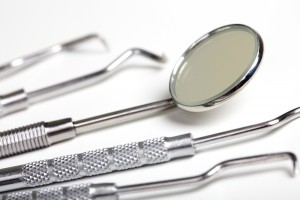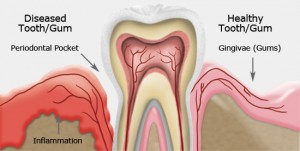
If the eyes are the windows to one’s soul and the hair is the crowning glory, the smile is considered as the best make up a person can wear. Yet, how can your beauty truly radiate when you are suffering from gum disease? This kind of disease does not only look awful, it also causes teeth discoloration and bad breath. It fact, it can even lead to a number of serious adverse effects.
What is a gum disease?
Gum disease, also referred to as periodontitis or gingivitis, starts off with the growth of bacteria in the mouth and may conclude with loss of tooth, if not properly taken care of. This is caused by the deterioration of the tissue around the teeth.
Being the mild type of gum disease, gingivitis commonly does not cause severe discomfort. However, it causes the gums to turn red, swell, and bleed quickly. It is usually due to poor dental hygiene. With proper oral care, gingivitis can easily be reversed. Continue reading →
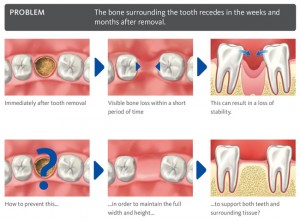
Taking good care of one’s oral health lowers the chances of dental health complications, but sometimes, problems may still arise. Luckily, we live in a time where modern health care techniques are available, allowing therapy and restoration of teeth. Dentists make use of various health care procedures, and one of these is bone grafting. Read on to know more about what bone grafts are really for, and the benefits that you will have if you avail of bone grafting.
What are bone grafts?
Bone grafting is the process of replacing missing bone to repair bone fractures and bone loss. There are a lot of bone grafts that may be done all over the body, but today the focus is on dental bone grafting procedures. When you lose your teeth through gum disease or any kind of trauma, you may want to make use of bone grafts in order to keep your bone in its current form. Bone grafts may also be done even if you have had your teeth pulled out years ago; the procedure will restore your bone to its previous form. Continue reading →
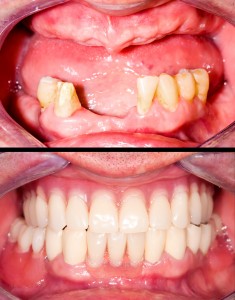
For a lot of people, there would eventually come a point when your dentist would break the news that their tooth (or teeth) can no longer be saved. It has to be extracted in order to avoid causing further damage to the remaining teeth. Missing teeth may cause a number of concerns. On top of the list is how you would be able to smile confidently with a tooth or teeth, missing. The good news is that there are actually available options about what you can do with that empty space.
- Dentures
This is the most affordable among the three options for missing teeth. Furthermore, dental insurance plans generally cover a percentage of the denture cost. You never have to hide your missing teeth for a long time since the removable false teeth could be fabricated in just a short time. Hence, you can immediately use to replace your missing tooth/teeth – even on the same day that you lose them. Since it is not fixed in your mouth, it is just a breeze to keep it clean. Continue reading →
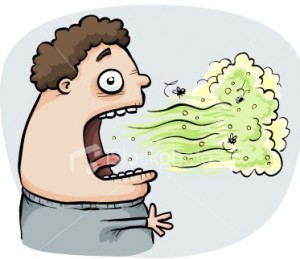
No matter how appealing or fashionable you are, when people smell an unpleasant odor the moment you open your mouth, they can easily be turned off. Halitosis, more commonly known as bad breath, can definitely affect a person’s day to day life, particularly in terms of communicating with others. Yet, it is very easy to treat, especially when you know what actually causes it.
What are the factors that cause bad breath?
- Xerostomia or Dry Mouth
When there is a decreased flow of saliva, the cleansing system of the mouth is also reduced. This, then, brings about the unpleasant breath odor. This case is most commonly caused by having a night’s sleep. Other causes include medicinal side effect and dehydration. It may also be an indicator of an underlying medical condition, like Sjögren’s syndrome. Radiotherapy to the neck and head part can also trigger bad breath due to xerostomia. Continue reading →
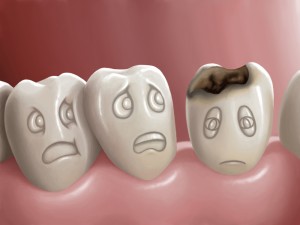
Some people tend to brush off health issues and not take action, as they usually get better by themselves. A person may, for example, ignore a small wound or a cold until it heals or eventually goes away. Unlike some health issues that go away when you ignore them, a cavity or tooth decay does not spontaneously get better and will only get worse, so action is needed the moment your dentist detects one.
What Are Cavities?
Cavities are holes in the teeth which are caused by a combination of bacterial growth and acidic environment. This is formed when microorganisms in your teeth surface become active (usually as they are regularly exposed to and feed on sugars in your mouth). When they do so, they start eating away at the hard tissue of your teeth, causing holes to form. A cavity may start out small, but when left unchecked and untreated, will simply continue to grow and cause more and more problems. Continue reading →

When there is a serious tooth infection, dentists will either extract the teeth recommend an endodontic treatment, which is otherwise known as a root canal. Root canals are done by endodontists, or dental health professionals who specialize in the procedure.
Is Root Canal A Better Option?
A root canal is done by removing the infected or inflamed pulp from inside the tooth. The endodontist then carefully cleans the area inside of the canal, fills it up, and seals the space. Then, the tooth is restored using a filling or a crown.
A root canal is often recommended because it saves the natural tooth. While having one’s tooth extracted may seem like an easier and quicker option, a root canal has advantages over extraction. It keeps your teeth as is, maintain your natural smile. It also promotes normal sensation and biting and promotes proper chewing. Continue reading →

Most people clench and grind their teeth from time to time, and doing so occasionally does not cause any harm. Constant grinding, gnashing and clenching (also known as Bruxism), however can cause problems and complications to your oral health.
What Causes Grinding Anyway?
Teeth grinding has always been attributed to crooked teeth or abnormal bite, but it also occurs as a result of anxiety and stress. While many people clench their teeth during the day, the bulk of teeth grinding usually happen at night during sleep, so it may be difficult to tell if you are among the many that do so.
While you may not catch yourself doing it in your sleep, you may notice some symptoms right when you wake up, which serve as telltale signs for Bruxism. Continue reading →

Not all mouthwashes are created equal. Some have ingredients that may be damaging your teeth without you knowing it. That’s why it is important to read the label and find out what’s in your mouthwash bottle before swishing.
Beware of Alcohol
One ingredient found in most mouthwashes is alcohol. This is a common ingredient because it acts as a carrier agent for other ingredients (such as menthol and thymol) allowing it to have bacteriostatic (bad bacteria killing) and bacteriostatic (arresting the progression of bad bacteria) properties. Using such kind of product is of course, good. However, long term use of alcohol-based mouthwash or rinses does carry serious potential health risks. Continue reading →



